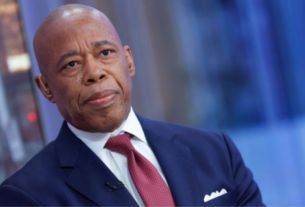Donald Trump has called on Russian President Vladimir Putin to end the war in Ukraine. He labeled the conflict “ridiculous” and warned of new sanctions if Russia continues its aggression. This marks a shift in Trump’s rhetoric as he emphasizes the need for diplomacy and more substantial economic pressure.
Trump’s comments came after the conflict entered its second year with no sign of a resolution. He argued that the war has caused unnecessary suffering and damage, not just to Ukraine but also to Russia and the global economy. He suggested that Putin should end the war quickly to avoid further economic isolation and hardship for Russia.
The United States has already imposed sanctions on Russia, targeting key sectors such as energy, finance, and defense. These measures have severely affected Russia’s economy. The ruble has lost significant value, and inflation has risen sharply, hitting ordinary Russians. Trump’s new call for sanctions reflects the ongoing pressure that the international community is placing on Russia.
Trump also warned that any further military escalation would lead to stricter sanctions. Though impactful, he pointed out that the current sanctions have not yet led to a change in Putin’s stance. Trump’s message is clear: more pressure will come without a shift in Russia’s actions.
The economic impact of these sanctions is felt globally. European countries have faced higher energy costs due to Russia’s reduced oil and gas exports. In the U.S., inflation has increased due to supply chain disruptions and rising energy prices. Trump’s call to end the war partly responds to these global economic pressures.
Trump’s position aligns with broader calls from Western leaders for a diplomatic solution to the conflict. Many have expressed concern about the long-term consequences of the war, including the possibility of a more significant regional conflict. Trump’s statement emphasizes the need to avoid further escalation and focus on finding a peaceful resolution.
The war in Ukraine has been a central issue in international politics. As the conflict drags on, countries worldwide have been forced to choose sides. Many nations in Europe and North America have supported Ukraine with military and financial aid. However, some countries in Asia and the Middle East have remained neutral, balancing their relations with Russia and the West.
While Trump’s position reflects the mainstream Western view, it is also shaped by his stance on U.S. foreign policy. He has been critical of prolonged military engagements abroad, arguing that the U.S. should focus on its interests. His call for Putin to end the war fits his broader “America First” approach to global politics.
Trump’s statement comes at a time when the U.S. and its allies are looking for ways to maintain pressure on Russia. European nations are grappling with the challenge of maintaining sanctions while avoiding economic damage to themselves. The U.S. is focused on supporting Ukraine and deterring further Russian expansionism.
The sanctions imposed on Russia have not been without criticism. Some argue that they have hurt ordinary Russians more than the political elite, and there is debate about their effectiveness in achieving a policy change. Trump’s remarks reflect the ongoing discussion about balancing economic pressure and diplomatic engagement.
As the war in Ukraine continues, the pressure on Putin to find a resolution will increase. Trump’s call to end the conflict adds to the growing chorus of voices demanding peace. Whether Putin will heed this advice remains uncertain, but the stakes for Russia, Ukraine, and the global community are high. The outcome will have significant implications for international relations and the future of global security.




